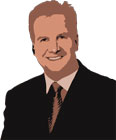
I just had the chance to read “The Confidence Factor” by Tom Mullins. Tom does a great job of using his insight as both a former winning football coach as well as the successful founding Pastor of Christ Fellowship in Palm Beach Gardens in Florida to weave together inspiring stories of people that had the confidence to lead and be successful. Tom also gives us very practical lessons on building confidence.
I’ve really never lacked confidence; which for me has been both a blessing as well as a curse. Being confident certainly is an enabler in leadership and in management. It propels us to find creative ways to solve people and logistical issues and it also helps us to keep striving when challenges arise.
For me, there have been times when I’ve been a little over-confident. Looking back, every instance of over-confidence not only led to less than satisfactory results but always had one common element. The common element was that that I was leaning and relying completely on my own abilities and talents and not fully trusting in God.
Successful churches require confident leaders. Confident leaders are similar to travel guides that make sure we see all the right sites, fitness instructors that improve our ability to exercise and firm up our flabby bodies, and wise professors that challenge us to learn not only the correct answers but also how to reason and use rationale to formulate answers to future and yet unknown questions. These leaders all have the experience in their unique area and also the confidence that they can communicate well what they already know.
One way for us to have confidence is to constantly build on our life lessons and to know that if we let Him, God is also willing to build us up and help us lead with confidence. The Apostle Paul said it well, “Being confident of this, that he who began a good work in you will carry it on to completion until the day of Christ Jesus.” (Philippians 1:6)
Ken Behr is executive pastor at Christ Fellowship, Palm Beach Gardens, FL. [www.gochristfellowship.com]





People will buy whatever is ‘one with a customer.’
An economist’s guess is likely being as effective as anybody else’s.